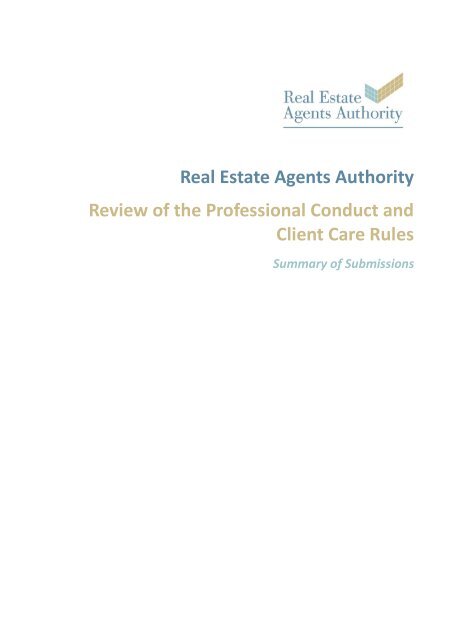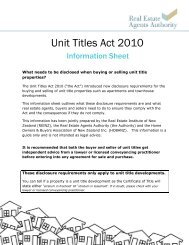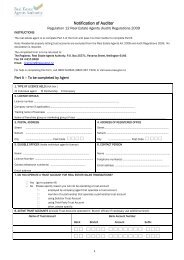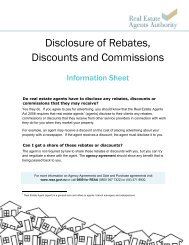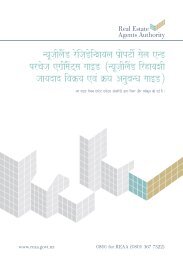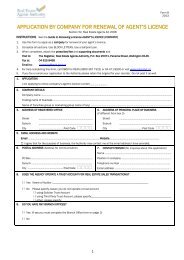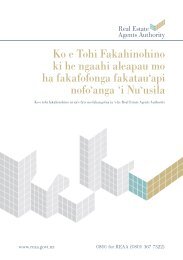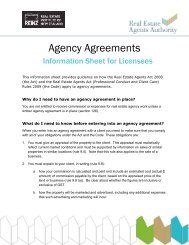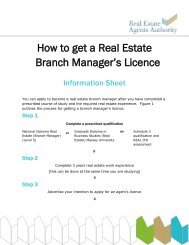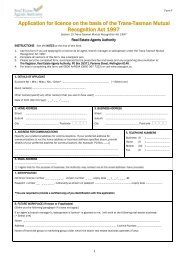Summary of Submissions - Real Estate Agents Authority
Summary of Submissions - Real Estate Agents Authority
Summary of Submissions - Real Estate Agents Authority
Create successful ePaper yourself
Turn your PDF publications into a flip-book with our unique Google optimized e-Paper software.
<strong>Real</strong> <strong>Estate</strong> <strong>Agents</strong> <strong>Authority</strong><br />
Review <strong>of</strong> the Pr<strong>of</strong>essional Conduct and<br />
Client Care Rules<br />
<strong>Summary</strong> <strong>of</strong> <strong>Submissions</strong>
Purpose<br />
1 This document summarises submissions made on a consultation document and consultation draft<br />
Code <strong>of</strong> Conduct produced by the <strong>Authority</strong> as a part <strong>of</strong> its review <strong>of</strong> the Pr<strong>of</strong>essional Conduct<br />
and Client Care Rules 2009 (the Code <strong>of</strong> Conduct).<br />
Background<br />
2 The Code <strong>of</strong> Conduct sets down a code <strong>of</strong> conduct, and a reference point for discipline, for real<br />
estate pr<strong>of</strong>essionals licenced under the <strong>Real</strong> <strong>Estate</strong> <strong>Agents</strong> Act 2008 (the Act).<br />
3 After two years <strong>of</strong> operation, the <strong>Real</strong> <strong>Estate</strong> <strong>Agents</strong> <strong>Authority</strong> (the <strong>Authority</strong>) is reviewing the<br />
code <strong>of</strong> conduct.<br />
4 In late 2011 and early 2012 the <strong>Authority</strong> undertook public consultation and released a<br />
consultation document on proposed changes to the Code <strong>of</strong> Conduct.<br />
5 In total the <strong>Authority</strong> received 31 submissions from:<br />
• eight real estate agencies<br />
• 14 individual licensees<br />
• two complainants<br />
• one public sector agency<br />
• one non-licensed industry organisation<br />
• two membership bodies representing real estate practitioners<br />
• one membership body representing a related pr<strong>of</strong>ession<br />
• two property law pr<strong>of</strong>essionals.<br />
6 These submissions varied in length between a short email and more substantial submissions <strong>of</strong><br />
between 10-20 pages. This document summarises these submissions.<br />
7 The <strong>Authority</strong> is now conducting a second round <strong>of</strong> consultation on the final proposed<br />
amendments to the Code <strong>of</strong> Conduct. A consultation document for this second round <strong>of</strong><br />
consultation is available from www.reaa.govt.nz.<br />
Overview <strong>of</strong> submissions<br />
8 The most commented on topics within the consultation document included:<br />
• definitions<br />
• appraisals<br />
• double commissions<br />
Code <strong>of</strong> Conduct <strong>Summary</strong> <strong>of</strong> <strong>Submissions</strong> June 2012 Page 2 <strong>of</strong> 12
• disclosure <strong>of</strong> defects (rule 6.5)<br />
• changes to the code for non-residential real estate sectors.<br />
9 Submitters also raised a number <strong>of</strong> other questions not directly related to the Code <strong>of</strong> Conduct<br />
consultation. A brief response to points raised is included in the table below.<br />
Issue<br />
Residential licensees should pay higher<br />
fees and levies than commercial or rural<br />
licensees.<br />
The Code <strong>of</strong> Conduct should contain<br />
information about the <strong>Authority</strong>’s<br />
complaints process.<br />
The <strong>Authority</strong> should charge a set fee to<br />
lodge a complaint.<br />
The Code should specify that<br />
commission is paid on settlement and<br />
not when contract goes unconditional.<br />
The Code should specify a requirement<br />
for in-person supervision through<br />
branch managers in each real estate<br />
<strong>of</strong>fice.<br />
There should be a ‘cooling <strong>of</strong>f’ period<br />
for Agency agreements.<br />
<strong>Authority</strong> response<br />
There is no current intention to review fees or levies<br />
for a number <strong>of</strong> years. This matter could be<br />
considered at such a time when fees and levies are<br />
reviewed.<br />
The <strong>Authority</strong> is always looking to improve<br />
information and guidance on the complaints process.<br />
Any updates in this area will be included in the<br />
<strong>Authority</strong>’s regular e-newsletters to the real estate<br />
industry and consumer organisations.<br />
There is no plan to review this matter. Charging a fee<br />
to lodge a complaint is inconsistent with other<br />
complaint processes and regulators, e.g banking<br />
ombudsman, electricity and gas complaints, financial<br />
advisor complaints.<br />
This is a contractual matter unrelated to the Code <strong>of</strong><br />
Conduct. Consumers can negotiate conditions such<br />
as how much and when to pay licensees when<br />
entering into agency agreements.<br />
Requiring in-person supervision in every <strong>of</strong>fice is<br />
counter to the provisions <strong>of</strong> the Act to permit more<br />
flexible supervision systems. The <strong>Authority</strong> is<br />
focussing, at this point in time, on ensuring that<br />
there is proper supervision, not the method <strong>of</strong><br />
supervision.<br />
The <strong>Real</strong> <strong>Estate</strong> <strong>Agents</strong> Act already provides for a<br />
cooling <strong>of</strong>f period in relation to sole agency<br />
agreements (see s 130 <strong>of</strong> the Act).<br />
Cooling-<strong>of</strong>f periods can lead to unforeseen<br />
circumstances and the <strong>Authority</strong> is focussed on<br />
ensuring that consumers have access to, and are<br />
advised to, consult expert advisors before signing<br />
real estate contracts.<br />
10 Submitters comments and views on the Code <strong>of</strong> Conduct and the consultation document are set<br />
out below according to the proposed rule to which they relate and then specific issues (eg<br />
sectoral differences and buyers agency) that apply across multiple rules.<br />
11 The <strong>Authority</strong> did not receive any comments or proposals in relation to Rule 7. Therefore there is<br />
Code <strong>of</strong> Conduct <strong>Summary</strong> <strong>of</strong> <strong>Submissions</strong> June 2012 Page 3 <strong>of</strong> 12
no section dedicated to this rule in this document.<br />
Rule Four: Interpretation<br />
12 The consultation document contained a number <strong>of</strong> suggestions in relation to the proposals to<br />
define client, land and questions about how to define prospective client. One submitter<br />
contended that the Code <strong>of</strong> Conduct should not define anything that is not already defined in the<br />
Act in order to avoid acting ultra vires.<br />
13 Some submitters considered that it is unnecessary to define either client or land as they are<br />
defined in the Act. Others supported the addition <strong>of</strong> these definitions into the Code <strong>of</strong> Conduct.<br />
One submitter, while supportive in principle, warned <strong>of</strong> the risks related to making amendments<br />
to the Act which do then not flow through to the Code <strong>of</strong> Conduct.<br />
14 One submitter suggested implementing internationally consistent terms and definitions.<br />
15 Submitters suggested the following additional definitions.<br />
• Agent (with a capital A to designate licensee who hold an <strong>Agents</strong> licence)<br />
• agency agreement<br />
• branch manager<br />
• sole agency agreement.<br />
Rule Five: Standards <strong>of</strong> pr<strong>of</strong>essional competence<br />
16 The consultation document proposed a change to rule Five that would see explicit inclusion <strong>of</strong><br />
consumer protection law in rule 5.2 with a footnote referencing the Fair Trading Act, Consumer<br />
Guarantees Act and the Contractual Remedies Act.<br />
17 Submitters predominantly focussed their comments on the consultation document’s questions in<br />
relation to emphasising consumer protection law. Three submitters supported the proposed<br />
change to reference consumer law and in particular the Fair Trading Act, Consumer Guarantees<br />
Act and the Contractual Remedies Act. Others supported the principle <strong>of</strong> better emphasising the<br />
importance <strong>of</strong> wider consumer protection law, but were concerned that listing some specific<br />
statutes may lead to licensees focussing their attention on those laws when there are other<br />
aspects <strong>of</strong> consumer law which licensees may breach.<br />
18 One late submission also considered recent Tribunal cases and decisions and proposed that rule<br />
5.1 should be amended to provide that, where there are legal or technical issues in relation to<br />
land or a business, it should be sufficient for the licensee to recommend that the customer or<br />
client take expert or legal advice.<br />
Code <strong>of</strong> Conduct <strong>Summary</strong> <strong>of</strong> <strong>Submissions</strong> June 2012 Page 4 <strong>of</strong> 12
Rule Six: Standards <strong>of</strong> pr<strong>of</strong>essional conduct<br />
19 The consultation document suggested amendments to the code to:<br />
• require licensees to inform customers <strong>of</strong> their fiduciary obligations to their client<br />
• move rule 6.5 into new rule 10<br />
20 The consultation document also asked whether rule 6.5 should be amended to require a licensee<br />
to both obtain confirmation from their client that there are no defects and inform customers <strong>of</strong><br />
significant potential risks.<br />
21 A number <strong>of</strong> submitters commented on the proposed changes in relation to requiring a licensee<br />
to inform customers <strong>of</strong> their fiduciary duty to clients and moving rule 6.5.<br />
22 One submitter included a suggestion that rule six should include a provision that client money<br />
must be held separately from other monies and be covered by adequate insurance.<br />
Disclosure to customers <strong>of</strong> fiduciary duty<br />
23 Of the submitters that commented on this issue only one was supportive. This submitter<br />
considered that New Zealand needed to ensure that more information is provided to match<br />
international best practice. One submitter questioned when a licensee should be required to<br />
inform customers in order to discharge this duty.<br />
24 The submitters that opposed this proposal contended that the <strong>Authority</strong>’s approved guides<br />
already inform customers <strong>of</strong> the licensees relationship with their client, one considered that all<br />
people realise who is paying the agent and another that this proposal would create more<br />
confusion rather than clarity.<br />
Disclosure <strong>of</strong> defects (rule 6.5)<br />
25 The consultation document included a proposal to move rule 6.5 from rule six to new rule 10 and<br />
a question about whether both <strong>of</strong> the sub-paragraphs should be retained. Submitters provided a<br />
number <strong>of</strong> comments on rule 6.5 including:<br />
• that rule 6.5 needs to be significantly reworded<br />
• the ‘know or should know’ test should be replaced by a reasonable person test<br />
• that rule 6.5 should require written confirmation from sellers about defects<br />
• that rule 6.5 should remain in rule six and not be moved.<br />
26 One submitter suggested that rule 6.5 should use the term ‘property’ instead <strong>of</strong> land to reflect<br />
that the use <strong>of</strong> the term in the rule is broader than a common understanding <strong>of</strong> the word land.<br />
27 Another submitter advised that in the rural setting what constitutes a ‘defect’ can be difficult.<br />
The proposed use by buyer <strong>of</strong>ten impacts on whether there are ‘defects’ (e.g. different farming<br />
requires different water requirements). Customers routinely do not disclose their intended use <strong>of</strong><br />
the property as it can affect the price that they would have to pay. However, this submitter<br />
considered that the current wording <strong>of</strong> rule 6.5 was adequate and worked in rural practice.<br />
Code <strong>of</strong> Conduct <strong>Summary</strong> <strong>of</strong> <strong>Submissions</strong> June 2012 Page 5 <strong>of</strong> 12
28 One submitter considered that rule 6.5 is adequate as written and another thought that both rule<br />
6.5(a) and 6.5(b) provided for useful and complementary avenues for licensees to confirm with<br />
clients and access the information that they have about the property.<br />
Rule Eight: Agent’s awareness <strong>of</strong> duties and<br />
obligations<br />
29 The consultation document included suggestions to change the title <strong>of</strong> the rule, reorder rule eight<br />
and new rules relating to an agent’s supervision responsibilities. The proposed changes were to:<br />
• modify the title <strong>of</strong> the rule so that it is “Duties and obligations <strong>of</strong> agents”.<br />
• move rule 8.4 so that it is after 8.2.<br />
• create a section header called “supervision” after rule 8.3 and before rule 8.4.<br />
• add a new rule to require agents to ensure that licensees they employ or engage are<br />
familiar with current issues in the industry. This is designed to reinforce that agents should<br />
be ensuring that their staff are aware <strong>of</strong> recent legal changes, significant tribunal or court<br />
decisions and any other relevant developments in the industry that real estate pr<strong>of</strong>essionals<br />
should have an understanding <strong>of</strong>.<br />
• add a new rule requiring agents to provide on-going support and supervision to all licensees<br />
employed or engaged by them.<br />
30 The consultation document also asked questions about whether greater emphasis on supervision<br />
was warranted.<br />
31 A number <strong>of</strong> submitters agreed with the proposed changes and viewed them as positive changes<br />
which clarified and better defined what an agent’s supervision duties are. Another submitter<br />
considered that s50 <strong>of</strong> the Act was adequate and the proposals around supervision are<br />
unnecessary.<br />
32 One submitter contended that the proposals around current issues, such as Tribunal decisions and<br />
<strong>Authority</strong> advice, are unnecessary and they are predominantly already covered by rule 5.2 which<br />
requires licensees to have a sound knowledge <strong>of</strong> the Act and the Rules.<br />
33 One submitter considered that these changes should instead be implemented through the Duties<br />
<strong>of</strong> Licensees regulations to avoid being ultra vires.<br />
34 One submitter suggested that rule 8.5 should be listed before rule 8.4 to create a better flow from<br />
high level to more detailed obligations and that rule 8.6 should be reworded to require agent’s to<br />
‘make reasonable opportunities’ to licensees to become aware <strong>of</strong> recent legal changes. This was<br />
suggested so that the rule could reflect the practical difficulties associated with the predominant<br />
engagement <strong>of</strong> salespersons as independent contractors as opposed to direct employment<br />
relationships.<br />
Code <strong>of</strong> Conduct <strong>Summary</strong> <strong>of</strong> <strong>Submissions</strong> June 2012 Page 6 <strong>of</strong> 12
Rule Nine: Client and customer care<br />
35 The consultation document contained a number <strong>of</strong> proposed amendments and additions to, and<br />
questions about, rule nine. These were:<br />
• replacing the word “when” with “before” in rule 9.8<br />
• amending rule 9.21 (confidentiality) to better align with the Privacy Act<br />
• questions about when licensees should give warnings about double commissions.<br />
36 Double commissions and agency agreements attracted the largest number <strong>of</strong> comments from<br />
submitters.<br />
37 One submitter suggested that rule 9.3 (communication with clients) needs to be clarified as there<br />
can be multiple licensees involved in an agency agreement (company agent, supervising agent,<br />
listing salesperson and other salespersons). The communication obligations should only be<br />
placed on a single licensee. Another suggested that rule 9.3 should only apply to sole agency<br />
agreements due to the prevalence <strong>of</strong> long term general agency agreements in the commercial<br />
sector.<br />
38 One submitter contended that the proposal to change the requirements <strong>of</strong> rule 9.8 from “when”<br />
to “before” is not a technical or minor amendment as claimed in the consultation document and<br />
that this amendment is not required.<br />
39 All <strong>of</strong> the submitters who commented on the proposed changes to confidential client information<br />
were supportive <strong>of</strong> the proposed changes. One <strong>of</strong> these submitters suggested that these<br />
requirements would be best narrowed to confidential personal information <strong>of</strong> the clients.<br />
Double commissions<br />
40 In general submitters overwhelmingly called for the <strong>Authority</strong> to intervene in some way to<br />
address industry concerns in relation to clients being exposed to double commission claims.<br />
Table One: Double commission submissions<br />
No <strong>of</strong> subs<br />
Issue<br />
4 Double commissions are a very important issue that the industry is facing that the<br />
<strong>Authority</strong> needs to intervene in.<br />
2 The warning for double commissions should be given when the client has an existing<br />
agency agreement in place.<br />
3 Set timing requirement for cancellation <strong>of</strong> agency procedures<br />
2 Set processes for cancellation <strong>of</strong> agency procedures<br />
1 The <strong>Authority</strong> should require licensees to resolve double commission disputes and not<br />
allow clients to be subject to double commissions<br />
41 One submitter contended that it is a client’s obligation to read and understand what they are<br />
signing. The only obligation for licensees should be to inform their client that an agency<br />
agreement and a sale and purchase agreement are legally binding.<br />
Code <strong>of</strong> Conduct <strong>Summary</strong> <strong>of</strong> <strong>Submissions</strong> June 2012 Page 7 <strong>of</strong> 12
Agency Agreements<br />
42 Some submitters contended that there should be exemptions from the requirement to obtain an<br />
agency agreement when:<br />
• representing commercial clients<br />
• representing retail and industrial clients<br />
• managing a mortgagee sale.<br />
43 One submitter also contented that licensees should be permitted to obtain a commission from<br />
both parties (buyer and seller) where there is informed consent from both parties.<br />
44 Another submitter suggested that licensees should be required to explain what the Attorney’s<br />
consent clause in agency agreements actually means to ensure that licensees are not misleading<br />
prospective clients on their ability to amend agency agreements, following advice from their<br />
lawyer, after they have signed the contract.<br />
New Rule Ten: Duties when selling<br />
45 This proposed new rule contains those rules from rule nine and rule 6.5 that specifically relate to<br />
a licensees obligations when their client is a seller and includes amendments requiring licensees<br />
to:<br />
• inform their clients when an appraisal has been conducted without any comparable sales to<br />
base the appraisal on<br />
• explain to prospective clients when an agency agreement will finish.<br />
46 Submitters provided a number <strong>of</strong> comments on this new rule which separates out existing rules<br />
that only relate to agency relationships and duties when the client is a seller.<br />
47 One submitter suggested that rules 10.11 and 10.12 are inappropriately placed under the<br />
marketing and advertising sub-heading and should have their own separate heading to emphasise<br />
their focus on contractual matters.<br />
48 Another submitter was <strong>of</strong> the opinion that rule 10.12 (which sets out record keeping obligations)<br />
is inappropriately targeted at all licensees and creates unnecessary complication. They suggested<br />
that instead rule 10.12 should be an obligation on agent licensees (as the agent with whom the<br />
client has an agency agreement) and that salespersons and branch managers should have a<br />
related duty to ensure that copies <strong>of</strong> all sale and purchase agreements are provided to their agent<br />
for their records.<br />
49 Submitters provided feedback that rule 10.18 (prohibiting marketing and <strong>of</strong>fering without an<br />
agency agreement) is a significant barrier in commercial and mortgagee sales and one suggested<br />
that it should be amended to allow for presentation <strong>of</strong> unsolicited <strong>of</strong>fers.<br />
50 One submitter suggested that rule 9.1 is not adequately enforced or respected in relation to<br />
selling property for clients. They contended that licensees breach their fiduciary duty to their<br />
clients whenever they refuse to allow another agency access to the property to bring a customer<br />
Code <strong>of</strong> Conduct <strong>Summary</strong> <strong>of</strong> <strong>Submissions</strong> June 2012 Page 8 <strong>of</strong> 12
through the property. They recommended that rule 10.4(c) be amended to require licensees to<br />
specify when signing up clients how the agent would deal with other agencies on a conjunctional<br />
basis.<br />
51 The other parts <strong>of</strong> this rule that attracted the most comments were appraisals and questions in<br />
relation to better disclosure <strong>of</strong> individual incentives.<br />
Appraisals<br />
52 The consultation document included a new rule relating to notifying clients when there was<br />
insufficient information or comparable sales to make an accurate appraisal. Many submitters<br />
were supportive <strong>of</strong> this proposal, but concerned about possible misuse or abuse by licensees.<br />
One submitter, while supportive <strong>of</strong> the rule, suggested that this new rule differentiate between<br />
information that does not exist and data that the licensee may not be able to access, or has<br />
decided not to access due to associated costs. Another submitter supported this rule, but wanted<br />
to see restrictions for residential real estate where licensees have, at a cost, easy access to<br />
databases with comparable sales information.<br />
53 One submitter questioned whether the Code <strong>of</strong> Conduct required a new appraisal when resigning<br />
sole agency agreements after 90 days.<br />
54 One submitter suggested that appraisals should be able to contain a price range, rather than a<br />
specific price. Another questioned the relevance or desirability <strong>of</strong> requiring appraisals for general<br />
agencies where clients are likely to receive a number <strong>of</strong> appraisals.<br />
55 Another contended that the requirement for a written appraisal was only when an appraisal was<br />
given and that the Code <strong>of</strong> Conduct could not require licensees to conduct an appraisal in all<br />
situations.<br />
56 One submitter was <strong>of</strong> the opinion that most licensees do not have the adequate skills and<br />
knowledge to provide a quality appraisal and as such they would seek to use this new rule to<br />
avoid conducting appraisals.<br />
57 One submitter who did not support the proposed changes to the Code <strong>of</strong> Conduct around<br />
appraisals suggested that a lack <strong>of</strong> comparable sales would be readily apparent to a client when<br />
the agents’ appraisal <strong>of</strong> their property did not contain any comparable properties or sale<br />
information. Another submitter suggested that it is unrealistic to require an appraisal on a<br />
business as a going concern and that in these situations clients should obtain a valuation.<br />
58 One submitter suggested that rule 10.1 be amended to include a sentence such as “licensees must<br />
not inflate their appraisal <strong>of</strong> the property as a means <strong>of</strong> obtaining an agency agreement” as a<br />
useful tool to discourage licensees from “buying listing”.<br />
59 One submitter suggested that licensees should be required to advertise the appraised price.<br />
Disclosure <strong>of</strong> individual incentives<br />
60 The consultation document asked submitters about whether licensees should be required to<br />
disclose differences in individual financial incentives when recommending specific sales method.<br />
The <strong>Authority</strong> understands that it is commonplace for a listing agent to obtain different splits <strong>of</strong><br />
Code <strong>of</strong> Conduct <strong>Summary</strong> <strong>of</strong> <strong>Submissions</strong> June 2012 Page 9 <strong>of</strong> 12
the commission depending on the method <strong>of</strong> sale being conducted (e.g. auction vs tender).<br />
61 Of those submitters that commented on this question, six were opposed, three considered it an<br />
appropriate change with one other submitter suggesting that this would only be relevant for<br />
salesperson licensees.<br />
Rule Eleven: Information about complaints<br />
62 The consultation document included a proposal to modify rule 11.1 (formerly rule 10.1) to ensure<br />
that in-house complaints processes are transparent and current. The consultation document also<br />
asked questions about whether rule 11 should be amended to require licensees to disclose<br />
unresolved complaints to new employers when moving agencies.<br />
63 <strong>Submissions</strong> on this matter were divided with some submitters considering it beneficial while<br />
others opposed changes <strong>of</strong> this nature. Some <strong>of</strong> those who supported the proposal gave<br />
conditional support contending that it should not include current investigations or that it should<br />
not include vexatious or frivolous complaints that have not been investigated.<br />
64 Those against the proposal suggested that agencies should do their own due diligence when<br />
hiring or engaging new salespersons. One pointed out that currently, agencies could, with an<br />
individual’s consent, obtain this information already. One submitter suggested that this proposal<br />
was an employment matter and may not be appropriate for a pr<strong>of</strong>essional Code <strong>of</strong> Conduct.<br />
65 One submitter noted that some insurers, as a part <strong>of</strong> their policy, required immediate notification<br />
<strong>of</strong> complaints against current employees or contractors, and that this rule was important for this<br />
reason.<br />
Sector specific issues<br />
66 The consultation document included specific questions about whether the Code <strong>of</strong> Conduct<br />
needed to be modified for non-residential real estate sectors such as business brokering,<br />
commercial real estate or rural real estate.<br />
67 The consultation document also asked submitters for their views on whether the new rule 10<br />
should only apply to residential sales.<br />
Business brokering<br />
68 There were a small number <strong>of</strong> comments highlighting specific issues for business brokering.<br />
These comments were that:<br />
• it is difficult to secure an agency agreement<br />
• appraising businesses is either unnecessary or difficult<br />
• appraisals should not be required when selling a business franchise<br />
• it is very difficult to obtain comparative data for business appraisals.<br />
Code <strong>of</strong> Conduct <strong>Summary</strong> <strong>of</strong> <strong>Submissions</strong> June 2012 Page 10 <strong>of</strong> 12
Commercial real estate<br />
69 A number <strong>of</strong> submitters commented on commercial real estate issues. One submitter contended<br />
that there should be a separate Code <strong>of</strong> Conduct for commercial real estate. Another was <strong>of</strong> the<br />
opinion that the Code <strong>of</strong> Conduct, and indeed the Act could benefit from provisions that allow for<br />
sophisticated or large scale commercial clients from contracting out <strong>of</strong> consumer protection<br />
provisions.<br />
70 Another suggested that rule 9.3 should only apply to sole agency agreements due to the<br />
prevalence <strong>of</strong> long term general agency agreements in the commercial sector.<br />
71 Many submitters commented on appraisals for commercial real estate stating issues such as a lack<br />
<strong>of</strong> available information due to confidentiality clauses in contracts and that most commercial<br />
clients obtain valuations and therefore do not need appraisals.<br />
72 One issue that submitters put forward is that it is difficult for licensees to obtain agency<br />
agreements, including general agencies, from sellers/lessors. Linked to this issue were<br />
submissions which sought greater clarity about the <strong>Authority</strong>’s view on what constituted<br />
‘<strong>of</strong>fering’. One submitter requested specific guidance on <strong>of</strong>fering.<br />
Rural real estate<br />
73 Submitters commenting on rural real estate commented on difficulties in relation to appraisals.<br />
This is primarily due to the possibility <strong>of</strong> large price variations due to stock or herds being valued<br />
only 10 days before settlement. This means that many rural transactions are unconditional and<br />
agreed far in advance <strong>of</strong> a final valuation and price being reached.<br />
74 Another area that rural submitters suggested possible concerns around was rule 10.8. In many<br />
rural settings sellers are reluctant to sign a formal agency agreement until the agency has a<br />
serious prospective purchaser.<br />
75 Rules relating to all material particulars (rule 9.7) can also be problematic in rural transactions.<br />
Material particulars such as DDT testing, soil tests and company share details are typically not<br />
available at the point <strong>of</strong> listing and are instead provided during the marketing and <strong>of</strong>fering<br />
process.<br />
Rule 10 and residential sales<br />
76 Submitters were overwhelmingly supportive <strong>of</strong> rule 10 applying to selling in all sectors.<br />
77 One submitter pointed out that it would be rather difficult to differentiate between properties.<br />
For example lifestyle blocks are located in rural areas but are typically considered residential<br />
properties.<br />
Other matters<br />
78 The consultation document also contained questions about vulnerable consumers and whether<br />
licensees should be required to recommend that clients and customers obtain legal advice.<br />
Code <strong>of</strong> Conduct <strong>Summary</strong> <strong>of</strong> <strong>Submissions</strong> June 2012 Page 11 <strong>of</strong> 12
79 Submitters also requested information and guidelines on:<br />
• what constituted ‘<strong>of</strong>fering’ land or a business<br />
• appropriate processes for multi-<strong>of</strong>fers<br />
80 In additions some submitters provided feedback about the Code <strong>of</strong> Conduct’s provision in relation<br />
to buyers agents.<br />
Vulnerable consumers<br />
81 Question 21 in the consultation document asked if the Code <strong>of</strong> Conduct could be modified to<br />
provide increased protection for vulnerable consumers. Industry submitters were not supportive<br />
with questions and concerns about how a vulnerable person would be defined, that this was not<br />
needed in the commercial sector and that whether someone was ‘vulnerable’ would be too<br />
difficult for salespersons to assess and would be open to abuse by lawyers. One submitter<br />
suggested that the <strong>Authority</strong> could look at the Commerce Commission’s use <strong>of</strong> the term ‘capacity’<br />
if it were to take this concept further.<br />
82 One submitter considered that in-house and the <strong>Authority</strong>’s complaints processes sufficiently<br />
protected vulnerable consumers.<br />
Recommending legal advice<br />
83 The consultation document included a question about whether licensees should be required to<br />
recommend, rather than allow a consumer time to obtain, legal advice before signing a<br />
contractual document (e.g. agency agreement or sale and purchase agreement).<br />
84 Some submitters considered that this was an appropriate step and that licensees should be<br />
recommending legal and expert advice throughout the buying process or that licensees should<br />
recommend that people making legally binding agreements get legal advice. Other submitters<br />
considered that the current disclaimers and provisions were adequate, while one suggested that<br />
recommending legal advice should only be required where the licensee is aware <strong>of</strong> defects (under<br />
rule 6.5).<br />
Buyers agency<br />
85 Some submitters, including one buyers’ agent, contended that there should be an additional rule,<br />
similar in nature and substance to new rule 10, that places specific and appropriate consumer<br />
protection obligations on buyers agents.<br />
Conclusions<br />
86 <strong>Submissions</strong> were varied and robust with a number <strong>of</strong> views on both the consultation document<br />
and wider issues.<br />
87 Most notable were the concerns from industry about double commissions and appraisals.<br />
Code <strong>of</strong> Conduct <strong>Summary</strong> <strong>of</strong> <strong>Submissions</strong> June 2012 Page 12 <strong>of</strong> 12


